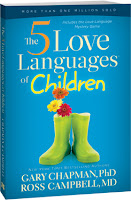Shortly after we were married, someone gave me The 5 Love Languages book. At first I was skeptical but after reading the book and identifying my own love languages, I became a believer. So much so, that I asked the director of the adolescent mental health facility that I worked in to let me create a workshop on the book as it applied to the youth that were in our care.  It was amazing to look at the youth as individuals, most of which seriously lacked in any type of love or discipline. Applying The 5 Love Languages to those girls really exemplified how effective the lessons really are.
It was amazing to look at the youth as individuals, most of which seriously lacked in any type of love or discipline. Applying The 5 Love Languages to those girls really exemplified how effective the lessons really are.
If you are unfamiliar with the five love languages they are; Physical Touch, Words of Affirmation, Quality Time, Gifts and Acts of Service. Each person will have primary and secondary love languages and if you are wondering what yours might be, you can take the online assessments or the quiz in the back of the book. They even have free study guide for use in small groups. You will also want to check out the new children’s book A Perfect Pet for Peyton. You can read my review here.
If you are a parent or teacher, you will want to take the time to read The 5 Love Languages of Children for the special sections on discipline and learning. There is also an excellent chapter on Anger and Love and Single-parent families.
One of concepts in the book that I really relate with is the idea of a “love tank.” The idea is exactly what it sounds like. A person (not just children) have a need and natural desire to feel loved and when they are not getting their needs met or meeting the needs of others, their love tanks become empty. Determining ones love language and then working to fill their love tank will cut back on some of the negative reactions that our children have when they are on “empty.”
When dealing with my own kids, I can easily tell when they are acting out because they are seeking attention/love rather than just being rebellious. Being able to identify your child’s love language and then use that as a primary part of your parenting will help you to know when what you are seeing is really a way to try to fill their love tanks.
The 5 Love Languages has recently been updated and is now available through the website. Here is a bit about the book:
To be their best, children need to feel loved. But if you and your child speak different love languages, your affection might get lost in translation, affecting the child’s attitude, behavior, and development. Dr. Gary Chapman’s groundbreaking Five Love Languages series has helped millions of couples communicate love more clearly, and Dr. Ross Campbell M.D. has applied the innovative system to children as well. The 5 Love Languages of Children gives practical suggestions for learning how your children interpret love and creating a sense of security in which they can thrive.
You can find out more about The Five Love Languages of Children, A Perfect Pet for Peyton and other materials in the series by visiting their website, liking them on Facebook and following on Twitter.


My Love language is words of Affirmation and Acts of Service
Without a doubt physical touch!
Acts of service
I took a quiz a couple of years ago. I was very close in Words of Affirmation and Gifts.
affirmation
ceis8009 at yahoo dot com
I think I am Quality Time!
I have taken the love languages quiz and found out mine is Gifts.
Words of Affirmation.